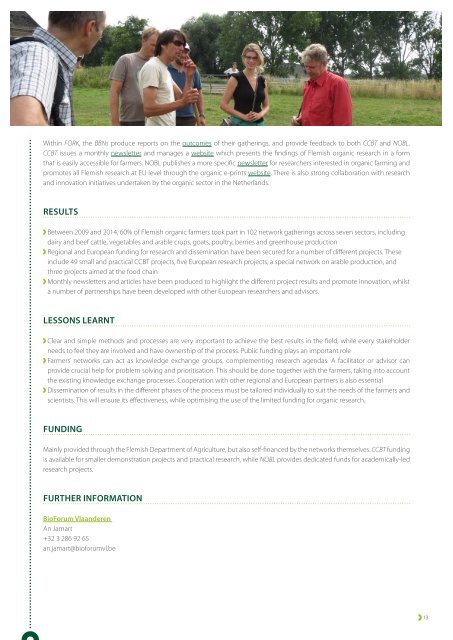ORGANIC COOPERATIVE APPROACHES TO RURAL DEVELOPMENT
Qgy8k
Qgy8k
You also want an ePaper? Increase the reach of your titles
YUMPU automatically turns print PDFs into web optimized ePapers that Google loves.
Within FORK, the BBNs produce reports on the outcomes of their gatherings, and provide feedback to both CCBT and NOBL.CCBT issues a monthly newsletter and manages a website which presents the findings of Flemish organic research in a formthat is easily accessible for farmers. NOBL publishes a more specific newsletter for researchers interested in organic farming andpromotes all Flemish research at EU level through the organic e-prints website. There is also strong collaboration with researchand innovation initiatives undertaken by the organic sector in the Netherlands.RESULTSBetween 2009 and 2014, 60% of Flemish organic farmers took part in 102 network gatherings across seven sectors, includingdairy and beef cattle, vegetables and arable crops, goats, poultry, berries and greenhouse productionRegional and European funding for research and dissemination have been secured for a number of different projects. Theseinclude 49 small and practical CCBT projects, five European research projects, a special network on arable production, andthree projects aimed at the food chainMonthly newsletters and articles have been produced to highlight the different project results and promote innovation, whilsta number of partnerships have been developed with other European researchers and advisors.LESSONS LEARNTClear and simple methods and processes are very important to achieve the best results in the field, while every stakeholderneeds to feel they are involved and have ownership of the process. Public funding plays an important roleFarmers’ networks can act as knowledge exchange groups, complementing research agendas. A facilitator or advisor canprovide crucial help for problem solving and prioritisation. This should be done together with the farmers, taking into accountthe existing knowledge exchange processes. Cooperation with other regional and European partners is also essentialDissemination of results in the different phases of the process must be tailored individually to suit the needs of the farmers andscientists. This will ensure its effectiveness, while optimising the use of the limited funding for organic research.FUNDINGMainly provided through the Flemish Department of Agriculture, but also self-financed by the networks themselves. CCBT fundingis available for smaller demonstration projects and practical research, while NOBL provides dedicated funds for academically-ledresearch projects.FURTHER INFORMATIONBioForum VlaanderenAn Jamart+32 3 286 92 65an.jamart@bioforumvl.be13


